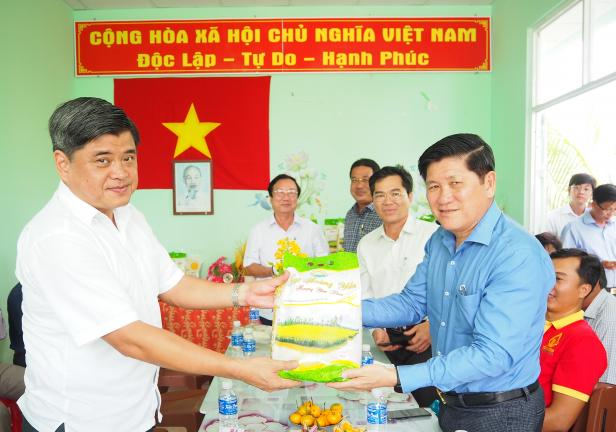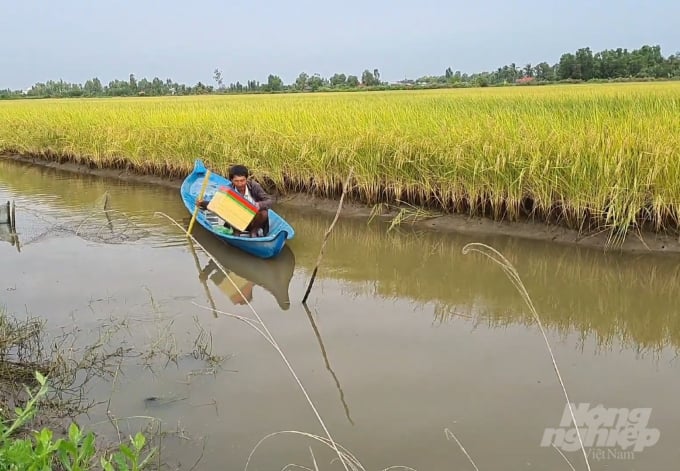November 23, 2025 | 10:23 GMT +7
November 23, 2025 | 10:23 GMT +7
Hotline: 0913.378.918
November 23, 2025 | 10:23 GMT +7
Hotline: 0913.378.918

Deputy Minister of Agriculture and Rural Development Tran Thanh Nam leads a delegation to work at the Tri Luc Rice - Shrimp Service Cooperative in Ca Mau province’s Tri Luc Commune, Thoi Binh District. Photo: Trong Linh.
A delegation from the Ministry of Agriculture and Rural Development, led by Deputy Minister Tran Thanh Nam, on April 6 visited the organic rice-shrimp farm - a new production model at the Tri Luc Rice-Shrimp Cooperative in Village 5 of Tri Luc Commune (Thoi Binh district, Ca Mau province).
The Tri Luc Rice - Shrimp Production Service Cooperative currently has 11 members with an authorized capital of VND150 million voluntarily contributed by the members each of whom gives about VND15-20 million. Currently, the cooperative owns an area of nearly 750 hectares for safe rice-shrimp production. Its members are following a clean production process to ensure a parallel healthy growth for the shrimps and rice without using chemicals or chemical fertilizers. This aims to create clean, quality and standard rice sources for the markets.
Annually, the cooperative supplies about 5-19 tons of rice to the market at a rather high price of VND 25,000-30,000/kg. Its rice products are very popular among customers inside and outside the province.
A delegation from the World Wide Fund for Nature of Vietnam (WWFVN) an international organization for nature conservation in Vietnam, recently also visited and conducted research at the co-opeartive. They could have selected 50 hectares for the research pilot of a model on improving the technology in building shrimp - rice sustainable chains with the aim to raise the value of shrimp and rice there.
Mr. Le Van Mua, Director of Tri Luc Rice - Shrimp Production Service Cooperative, said: “Local people have seen the profits when joining the cooperative with each kilogram of rice sold to the market at a price nearly twice higher compared to those products of rice specializing cultivation areas. By using organic fertilizers and organic pesticides, the shrimp also develops well and sustainably, so people are very interested in the cooperative's organic rice-shrimp production model.”

The current organic agricultural production is offering both a high economic value and friendly environment. Photo: Trong Linh.
After the harvested crop 2019-2020, the cooperative sold rice to the trading companies and the members themselves. At the same time, it decided to keep back 17 tons of rice for milling, packaging, and branding the Tri Luc organic rice.
“Then, the products are marketing in many other markets at a price from VND 27,000-30,000/kg. Up to now, the cooperative has sold many tons of clean rice, winning the favor of customers, contributing to improving the reputation of local specialty products. This is also a premise for Tri Luc organic clean rice brand to join the One Product Per Commune (OCOP) program,” said Mr. Mua.
Deputy Minister Tran Thanh Nam said a survey in processes from technical application to harvesting, as well as in product consumption of Tri Luc Rice - Shrimp Service Cooperative shows that the current orientation towards an organic agriculture production has brought in a very high economic value at the same with a friendly environment, very appropriate for human health.
This model is very effective and can help farmers get rich, according to the Deputy Minister.
He affirmed Ca Mau as one of the regions with natural ecological conditions, soil and water resources favorable for developing organic agricultural production. “This is a large advantage that many other areas do not have or they have to pass through a long transition from chemical to organic uses,” said Deputy Minister Tran Thanh Nam.

(VAN) The information was shared at the seminar 'Urban Agriculture - Solutions for Developing Green Spaces,' organized by the Kinh te & Do thi Newspaper and the Biotechnology Center of Ho Chi Minh City.
/2025/11/19/4141-2-132831_216.jpg)
(VAN) One of Japfa's outstanding solutions is implementing digital transformation and artificial intelligence (AI) to optimize operations, enhance productivity, and advance sustainable development.
/2025/11/19/4847-1-093540_448.jpg)
(VAN) The Gia Lai Provincial People’s Committee had a working session with the delegation of the U.S. Department of Agriculture, the State of Idaho, and representatives of the State's leading enterprises.

(VAN) Ca Mau has a sufficient foundation to become a strong regional aquaculture center, where production integrates the economy, the environment, and the lives of the people.

(VAN) SEIKI Group envisions itself as a pioneer in the ‘dual transformation’ of digital technology and green industry, standing alongside the Government and Vietnamese businesses in their pursuit of sustainable development.

(VAN) The VNGEONET network affirms Viet Nam's progress in mastering digital space, providing a precise positioning data platform to serve socioeconomic development.
/2025/11/14/3247-1-184556_35.jpg)
(VAN) Thai Nguyen is methodically implementing digital transformation in the livestock sector, laying the foundation for a modern, transparent, and sustainable agriculture.